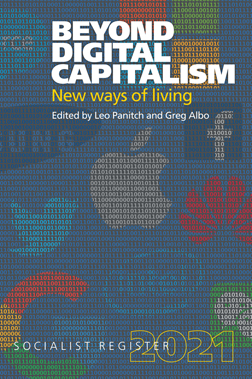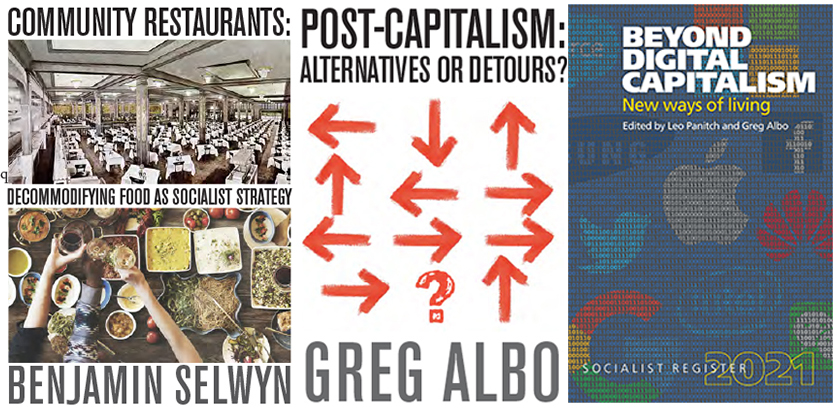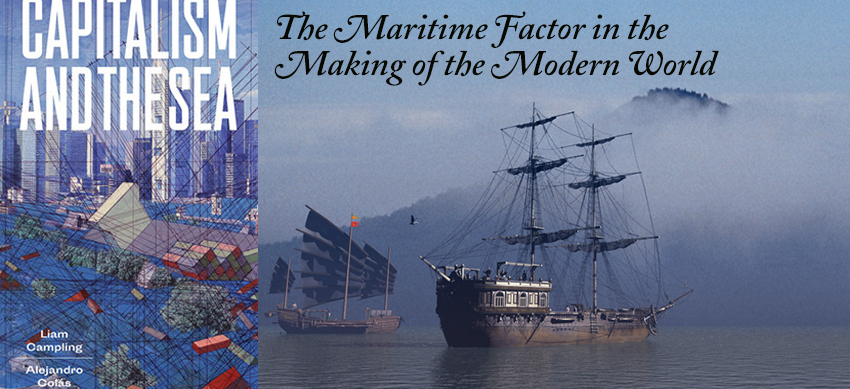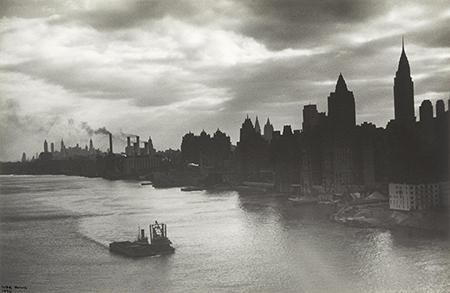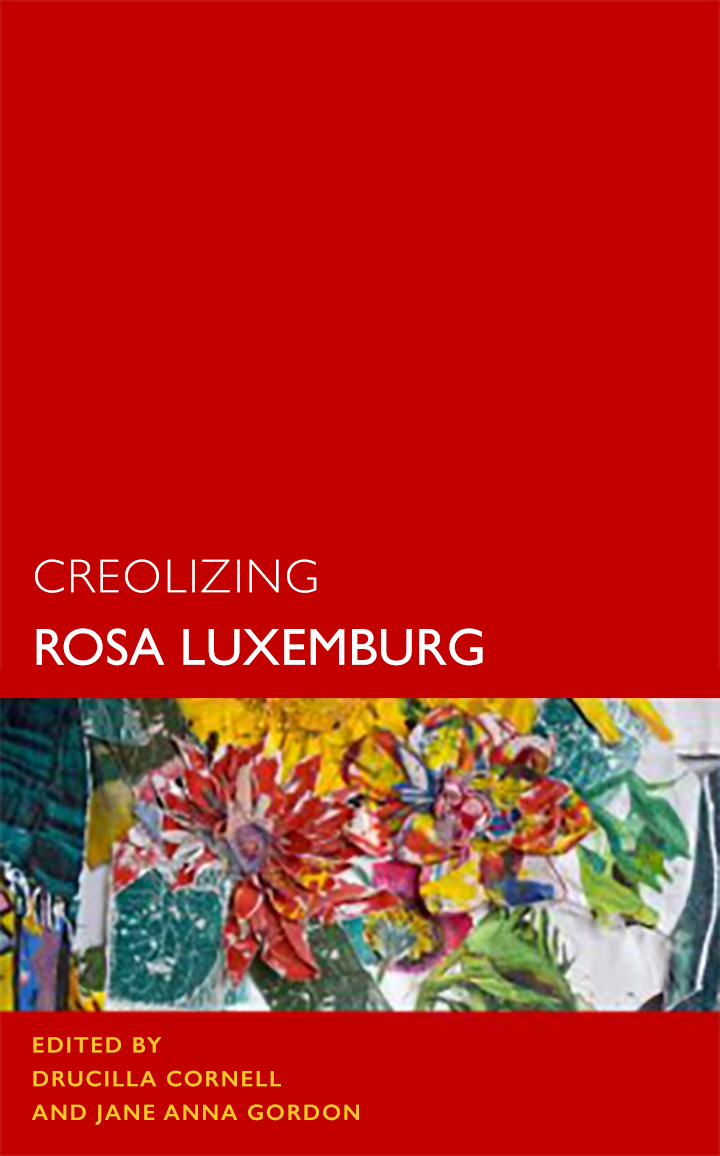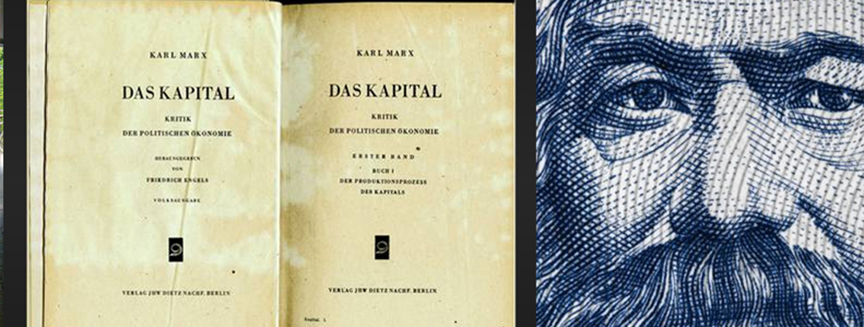Socialist Register 2021: Beyond Digital Capitalism (the entire series)
Online: Zoom link will be provided to registered participantsDual Presentation: Community Restaurants with Benjamin Selwyn / Postcapitalism: Alternatives or Detour?
Online: Zoom link will be provided to registered participantsWeek of Events
Socialist Register 2021: Beyond Digital Capitalism (the entire series)
Socialist Register 2021: Beyond Digital Capitalism (the entire series)
Beyond Digital Capitalism: New Ways of Living Continues on April 27 with another final session on May 2 There are tickets for each session for those who are unable to be present for this series. The series tickets provide entrance to the remaining 6 presentations with discussions. “In addressing how far digital technology has become ... Read more
Dual Presentation: Community Restaurants with Benjamin Selwyn / Postcapitalism: Alternatives or Detour?
Dual Presentation: Community Restaurants with Benjamin Selwyn / Postcapitalism: Alternatives or Detour?
Community Restaurants: Decommodifying Food as Socialist Strategy with Benjamin Selwyn The outbreak of Covid-19 has exacerbated many of the system’s worst aspects. In the UK, the birthplace of free wage-labor based capitalist agriculture, the pandemic has exacerbated existing food inequities. The pandemic has stimulated discussions about how to remedy the world’s corporate-dominated food system. The most popular alternative ... Read more
Capitalism and the Sea
Capitalism and the Sea
While sea beds are drilled for their fossil fuels and minerals, and coastlines developed for real estate and leisure, the oceans continue to absorb the toxic discharges of carbon civilization – warming, expanding, and acidifying the blue water part of the planet in ways that will bring unpredictable but irreversible consequences for the rest of the biosphere.
Empire’s Endgame: Racism and the British State (a close reading group)
Empire’s Endgame: Racism and the British State (a close reading group)
Empire's Endgame maps the complex relations between empire, racist culture, political economy, and the practices of a security-oriented state seeking legitimacy in times of unbearable economic uncertainty. While the book's story unfolds in Britain, its lessons and warnings may well apply to the United States and many other crisis-ridden imperialist polities.
Towards a Revolution in Labor History: White Supremacism and Bourgeois Social Control
Towards a Revolution in Labor History: White Supremacism and Bourgeois Social Control
Why is the US working class unorganized and suffering to a far greater extent than in other advanced capitalist societies?
Matters of State: Literature & Espionage
Matters of State: Literature & Espionage
WHY SPY NOVELS? Spy novels emerged as a distinct genre around the time of World War I, coinciding with the creation of formal intelligence agencies in many countries. This was a period characterized by heightened concern on the part of rulers about national security, imperial strength, and the impending conflict of the Great War. Spy novels from the early twentieth century reflect these concerns, and generally feature secret agents and seemingly realistic tales of international intrigue. With the rise of fascism, spy novels shifted their focus to examine the dynamics of political movements within individual states, assessing their threats to the stability of the international political order. In these stories, the anxiety over the powerlessness of the individual is assuaged by the resourcefulness and ultimate success of exceptional or lucky individuals in confronting such harrowing problems as war, nuclear proliferation, and terrorism.
New York City and the Experience of Modernity
New York City and the Experience of Modernity
This is a seminar about New York City and its people. It is not a study of architectural styles and objects, - although the physical stuff of cities does play a role -, but it is a course about the experience of the way in which modernity builds and destroys cities.
Modernity is a historical force. It is messy. In architecture history modernity is usually narrated as an interplay between the combined forces of the Industrial Revolution and capital, with social upheaval, explosive population growth and immigration as its result...
Creolizing Rosa Luxemburg: Reconsidering Primitive Accumulation
Creolizing Rosa Luxemburg: Reconsidering Primitive Accumulation
This session will be devoted to engaging with Rosa’s pivotal reworking of the concept of primitive accumulation, with attention to historical and contemporary South Africa, medieval European race-making and its legacies, and contemporary commodification of women’s reproductive labor.
Capital, Volume 1, Part 3
Capital, Volume 1, Part 3
Chapters 16 through 25, will trace this development and reveals new dynamics and contradictions inherent to the logic of capitalist accumulation, culminating in Chapter 25, The General Law of Capitalist Accumulation. These developmental processes continue to be played out to this day and are witnessed in the immensity of wealth for a few at one pole of humanity, poverty at another, ruthless misuse and degradation of nature, and reduction of the human subject, the producing masses of real individuals, to an alienated object for capitalist exploitation.

